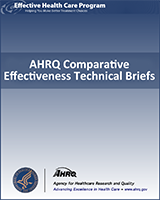NCBI Bookshelf. A service of the National Library of Medicine, National Institutes of Health.
Comparative effectiveness research is designed to inform health-care decisions by providing evidence on the effectiveness, benefits, and harms of different treatment options. The evidence is generated from research studies that compare drugs, medical devices, tests, surgeries, or ways to deliver health care.
The Effective Health Care Program funds individual researchers, research centers, and academic organizations to work together with the Agency for Healthcare Research and Quality (AHRQ) to produce effectiveness and comparative effectiveness research for clinicians, consumers, and policymakers.
Drawing on completed scientifc studies, technical briefs explain what is known — and what is not known — about new or emerging health-care tests or treatments.
Contents
- 47. Measuring Documentation Burden in Healthcare
- 46. Strategies To Address Racial and Ethnic Disparities in Health and Healthcare: An Evidence Map
- 45. Long COVID Models of Care
- 44. Measuring Primary Healthcare Spending
- 43. Measuring Healthcare Organization Characteristics in Cancer Care Delivery Research
- 42. Infection Prevention and Control for the Emergency Medical Services and 911 Workforce
- 41. Evaluation of Mental Health Mobile Applications
- 40. Interventions To Decrease Hospital Length of Stay
- 39. Disparities and Barriers to Pediatric Cancer Survivorship Care
- 38. Automated-Entry Patient-Generated Health Data for Chronic Conditions: The Evidence on Health Outcomes
- 37. Prevention, Diagnosis, and Management of Opioids, Opioid Misuse, and Opioid Use Disorder in Older Adults
- 36. Strategies for Patient, Family, and Caregiver Engagement
- 35. Characteristics of Existing Asthma Self-Management Education Packages
- 34. Impact of Community Health Worker Certification on Workforce and Service Delivery for Asthma and Other Selected Chronic Diseases
- 33. Treatment for Acute Pain: An Evidence Map
- 32. Pharmacologic and Nonpharmacologic Treatments for Posttraumatic Stress Disorder: Groundwork for a Publicly Available Repository of Randomized Controlled Trial Data
- 31. Mobile Applications for Self-Management of Diabetes
- 30. Assessment Tools for Palliative Care
- 29. Strategies for Improving the Lives of Women Aged 40 and Above Living With HIV/AIDS
- 28. Medication-Assisted Treatment Models of Care for Opioid Use Disorder in Primary Care Settings
- 27. Patient Safety in Ambulatory Settings
- 26. Telehealth: Mapping the Evidence for Patient Outcomes From Systematic Reviews
- 25. Disparities Within Serious Mental Illness
- 24. Resident Safety Practices in Nursing Home Settings
- 23. Genetic Testing for Developmental Disabilities, Intellectual Disability, and Autism Spectrum Disorder
- 22. Environmental Cleaning for the Prevention of Healthcare-Associated Infections
- 21. Management Strategies To Reduce Psychiatric Readmissions
- 20. Core Functionality in Pediatric Electronic Health Records
- 19. Public Reporting of Cost Measures in Health: An Environmental Scan of Current Practices and Assessment of Consumer Centeredness
- 18. Relationship Between Use of Quality Measures and Improved Outcomes in Serious Mental Illness
- 17. Imaging Techniques for Treatment Evaluation for Metastatic Breast Cancer
- 16. Decision Aids for Advance Care Planning
- 15. Transition Care for Children With Special Health Needs
- 14. Models of Cancer Survivorship Care
- 13. Gene Expression Profiling for Predicting Outcomes in Stage II Colon Cancer
- 12. Enzyme-Replacement Therapies for Lysosomal Storage Diseases
- 11. Noninvasive Diagnostic Techniques for the Detection of Skin Cancers
- 10. Whole-Body Vibration Therapy for Osteoporosis
- 9. Wheeled Mobility (Wheelchair) Service Delivery
- 8. Multidisciplinary Pain Programs for Chronic Noncancer Pain
- 7. Emerging MRI Technologies for Imaging Musculoskeletal Disorders Under Loading Stress
- 6. Stereotactic Body Radiation Therapy
- 5. Maternal-Fetal Surgical Procedures
- 4. Neurothrombectomy Devices for Treatment of Acute Ischemic Stroke
- 3. Vulnerable Atherosclerotic Plaque
- 2. Percutaneous Heart Valve Replacement
- 1. Particle Beam Radiation Therapies for Cancer
- AHRQ Comparative Effectiveness Technical BriefsAHRQ Comparative Effectiveness Technical Briefs
Your browsing activity is empty.
Activity recording is turned off.
See more...
